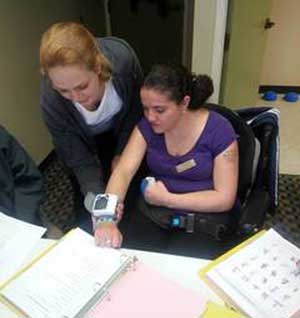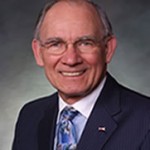Enroll in Health Matters with AdvocacyDenver to Get a Jumpstart on Those New Year’s Resolutions!



AdvocacyDenver’s Health Care Advocacy Program is offering a FREE Health Matters class from February through May, 1x a week (up to 2 hours) to community based day programs. Health Matters is an evidence based curriculum for persons with Intellectual and/or Developmental Disabilities (I/DD). The program focuses on becoming physically active, making health food choices, and maintaining a healthy lifestyle. The program offers community activities that will include visiting a local gym, picking out healthy snacks at a grocery store, attending health expos, and making healthy meal choices at a restaurant, etc. What better way to start out a healthy and happy 2017?
Health Matters is partnering with the Dahlia Center, 3401 Eudora St., classes will begin at the Dahlia Center from 10a-12pm, exact dates are negotiable dependent on the need.
If you are interested in participating, please contact Mary Sims, Wellness Educator:
303-974-2535
msims@advocacydenver.org
Educational Advocacy is Passion for Disability Law Executive
Mary Anne Harvey, Executive Director of Disability Law Colorado discusses Educational Advocacy with Catherine Strode
[Read more…] about Educational Advocacy is Passion for Disability Law Executive
Jeannie Ritter: ‘Early Intervention Key To Children’s Mental Health’ [Part 2]
Former First Lady Jeannie Ritter Believes Training and Early Intervention Are Essential Supports for Children’s Mental Health (Part 2)
[Read more…] about Jeannie Ritter: ‘Early Intervention Key To Children’s Mental Health’ [Part 2]
Former First Lady Jeannie Ritter Embraces Mental Health Advocacy [Part 1]
Former First Lady Jeannie Ritter Discusses Her Advocacy for Mental Health with Catherine Strode
[Read more…] about Former First Lady Jeannie Ritter Embraces Mental Health Advocacy [Part 1]
Health Care Advocacy News SPECIAL EDITION

[Read more…] about Health Care Advocacy News SPECIAL EDITION
DOI Commissioner Calls Exchange Leadership ‘Strong’ and Predicts Good Future
Colorado’s Insurance Commissioner, Marguerite Salazar, wants state residents to know where they can go for greater understanding of the benefits offered in insurance policies, and, where to file complaints when they are not satisfied with an insurance company’s practices. She says the Division of Insurance relies on consumers to know when something within an insurance company isn’t working for the consumer’s benefit.In this interview with Advocacy Denver’s Policy Outreach Specialist Catherine Strode, Commissioner Salazar also discussed the future of Colorado’s Health Exchange, predicting more financial viability in the years ahead.
[Read more…] about DOI Commissioner Calls Exchange Leadership ‘Strong’ and Predicts Good Future
Bill Strengthens State’s Medicaid Fraud Prosecution

Senate Bill 60, sponsored by State Senator Ellen Roberts, and passed with nearly unanimous bipartisan support, will put some teeth into the prosecution of Medicaid fraud across the state. Currently, the Attorney General’s office prosecutes provider fraud. But recipient fraud is handled through the counties, who often lack the personnel to conduct the investigative process.
In an interview with Catherine Strode, Coordinator of the Health Care Advocacy Program, State Senator Roberts said the bill’s main intent is to create a stronger system of tracking Medicaid fraud carried out by both health care providers and benefit recipients.
Why is this bill good for the state of Colorado?
“Because it will give us good information. Currently we don’t have any streamlined system to inform the legislature as to how much it’s occurring, who’s doing it, provider versus recipient. I think we have people out there saying one thing or another as if there’s strong data to back up their claims. When I went after getting that strong data, I couldn’t locate it.”
How will it be implemented?
“Medicaid fraud is handled in two different ways in Colorado. Grantee or recipient fraud is handled through the counties. The Departments of Human Services at the county level, when they see something that they’re concerned about, are to investigate it. If it rises to the level of abuse, then they are to turn it over to District Attorneys to prosecute the case. If it’s provider fraud, a physician or a hospital, then the Attorney General’s office is supposed to investigate and prosecute. So we have a split system which is why we don’t know at the State Legislature who’s doing what. How much Medicaid fraud is occurring? What’s being pursued? What I have heard from folks is there’s wild speculation both in terms of who’s doing it, how much money is involved, and how many people who actually deserve Medicaid benefits are being deprived because money is being filtered off the system by those who aren’t entitled to it.”
Are there statistics on Medicaid fraud in Colorado?
“No. That’s the point. There are some people who say it’s rampant. And yet last fall when I was trying to get a handle on this, nobody could give me accurate numbers. HCPF has data for what they cover but it’s not the state agency’s responsibility to pursue it on the recipient side. The Attorney General’s office has a Medicaid fraud control unit which has several million dollars a year that they recover. But that is only providers, not recipient fraud. What happens at the county level, because often the dollars involved are much smaller, there’s not really a strong pursuit of going after Medicaid fraud because it takes more time and personnel than they think they will actually recover. The way the statute currently reads is that even if a county were to recover Medicaid fraud proceeds, they have to turn it over to the state (the state being Health Care Policy and Financing) so there’s no incentive for the counties to really pursue it because they have to help pay for the District Attorney to actually prosecute. If they recover any money, they don’t even get the cost of prosecution.”
What is the effect you want the implementation of this bill to have?
“With the huge increase in Medicaid eligibility, the system is going to be overwhelmed for awhile, as we have more and more people enrolled both because we at the legislature expanded eligibility but also depending on what’s happening at the federal level. So I just want to make sure that those entitled to receive Medicaid benefits actually get them. That we don’t have a siphoning off of state money to people who aren’t entitled, or are abusing the system, whether they be providers or recipients of the benefits. There’s so much money at stake in Colorado’s Medicaid budget. That’s why I think we need to get to the bottom of this.”
House Minority Leader Rates Jobs Bills As Success

House Minority Leader Mark Ferrandino rates the passage of bills that have supported small businesses as the most significant ‘hallmark’ action of the Democratic caucus during the 2012 legislative session. Bills which have been proposed by the Democratic caucus to support job growth, but have failed, he rates as his greatest disappointment.
In an interview with Catherine Strode, Coordinator of the Health Care Advocacy Program, Minority Leader Ferrandino discussed his personal accomplishments and goals of the 2012 session. What does he consider as his greatest personal accomplishment of the session: state personnel reform. What is his greatest goal: passage of a bill to support Civil Unions.
What do you view as your greatest success of the 2012 session?
“You know getting a budget to pass 64 to 1 is a huge success for both parties. I think that’s a significant success. I think sticking on the message of jobs and the economy and the bills that we’ve pushed forward to help small businesses, to help entrepreneurs, really has been a strong hallmark of the Democratic caucus in the House. Some of those bills are still alive, some of them have passed and become law, and we’re still working with Republicans to try and find common ground on those. On a personal issue, I’ve worked hard on the personnel reform that the governor was pushing. That’s the bill that I’ve spent hours negotiating with both state workers and department heads to try and come to a good balance. I think we have that balance and it passed the House unanimously and just passed the Senate unanimously and it’s coming back to the House for consideration. I think that will be a significant piece of legislation. You know one thing that I’m just, personally, very hopeful for, it’s still in the process but, is civil unions. It’s going to be an uphill battle but if we can get that passed – that will be a significant victory for Colorado.”
And what’s your greatest disappointment so far?
“I think a lot of the jobs agenda that we’ve been pushing. Some of the things like (Representative) Max Tyler’s investment in small business development centers. (Representative) Dave Young’s tech transfer incentives, (Representative) John Kefalas’ angel investors. All those don’t seem as of right now that they’ll be moving forward and those are good, smart job creations with proven incentives, and investments. And, so unfortunately, we weren’t able to find bipartisan support for some of those. Maybe it will change in the next couple of weeks because some of them are still alive. I think some of my disappointment has been around places where we all agree we need to focus on job creation but we weren’t able to come together – Democrats and Republicans – to compromise and find the right vehicle to get those smart investments done for our economy and investments. And, so unfortunately, we weren’t able to find bipartisan support for some of those. Maybe it will change in the next couple of weeks because some of them are still alive. I think some of my disappointment has been around places where we all agree we need to focus on job creation but we weren’t able to come together – Democrats and Republicans – to compromise and find the right vehicle to get those smart investments done for our economy.”
What do you think are the most significant pieces of health care legislation to come out of the 2012 session?
“Representative Young and now Representative Gerou have a bill, 1281 on Medicaid Payment reform, which I’ve been involved with, on a pilot program and then opening it up to looking at global payment methods, and paying for performance, and outcomes versus fee for service. It could have a significant change in the way we deal with health care in the public sector. So I think that’s the most significant. I think that it has a very good chance of becoming law this year. Outside of that, I think the budget is always a significant health care bill because it deals with a lot of the funding for health care. Not having to cut provider rates at all this year, helping to put some more money into DD slots, some of those things I think were good in health care.”
And what is your opinion of the health care Long Term Services Relocation bill being proposed?
“When I was on the budget committee, I spent a lot of time raising concerns about how the Department of Human Services was managing the finances of the DD line items. And so I was pushing for people to look at should we move this to HCPF – given that a lot of the funding comes from HCPF because it goes through Medicaid. HCPF is a Department that’s much better at handling money – they’re kind of like an insurance company – where the Human Services is more of a service provider. So it might make sense to move more of the controls and financing to HCPF. That being said, there a lot of concerns that have been raised– what is this going to do to people with developmental disabilities? Are we going to make sure at the end of the day we’re not harming that population? And that’s the biggest key. I don’t think anyone wants to have a negative impact on that population. So we have to be very careful and diligent. The question is – is this the right way to do it? My hope is that they do it in a deliberate, systematic way that builds upon community input to try and do it. And if it moves forward – keep an open door through the process – to make sure that community concerns are addressed as both the bill moves forward and if the bill passes – then as the transition actually happens.”
Report Debunks High Salaries For Insurance Execs

Long Term Care Bill Stirs ‘Turf Wars’

State Senator Linda Newell is sponsoring Senate Bill 127, ‘Medicaid Health Homes Long-term Care Providers.’ The bill creates a provision for long-term care services to be included in Medicaid health homes for those individuals who are “Dual Eligibles” – or – eligible for both Medicare and Medicaid benefits. It ensures that these services will be included in the Accountable Care Collaboratives established under the guidelines of state health care delivery reform.
To ensure passage of the bill, State Senator Newell brought together a wide range of stakeholders including representatives of: senior organizations, hospital associations, assisted living facilities, and insurance plans. She told Catherine Strode, Program and Outreach Coordinator of the Health Care Advocacy Program, that negotiations over the final version of the bill resembled ‘turf wars.’
Senator Newell, please explain the intent of the bill and who brought it.
“The intent of SB 127 is to make sure that those who are dually eligible do not fall through the cracks and that they are allowed to get every service they possibly can being dually eligible. So we first worked with Leading Age Colorado on it, and then after that, the Colorado Health Care Association and the Center for Assisted Living. They came on board. Then the Behavioral Health Care Council came on board. And then AARP came on board and total long term care. Those are the major stakeholders. We also included Rocky Mountain Health Plans, United Healthcare, all of the major health care plans that cover this population. With all of this health care reform, we want to make sure that as they’re developing these Accountable Care Collaboratives and the Regional Care Organizations, they remember the long term care dually eligible. We wanted to make sure that as the Department of Health Care Policy and Finance is putting their rules together, that they are providing coordinated care. We want to make sure that the mental health or behavioral health care needs are met, not only the chronic condition. The integration of the care was really critical. To me that’s one of the most important parts of this bill – that it does promote that integrated care model.”
How would the bill be implemented?
“It’s very general and broad on purpose. So that as HCPF is putting their definitions together, it is allowing for all of these long term care providers to be at the table. Nobody is left out. It’s more of one of those bills that lays the foundation prior to the action. It’s putting into statute, and directing HCPF, to include the providers of long term care and services as part of their health home when they’re putting together their programs.”
What were the stakeholders’ concerns about SB 127?
“HCPF said they would be promulgating the rules around it but the stakeholders thought we needed to direct them to do it now because we don’t know what it might look like as they go about it. We had to work with the insurance plans to make sure that we came up with all of the language that they felt was broad enough but wasn’t restricting. On the other hand, one of the concerns was we didn’t want anything in statute with a definition that would give preference to any one kind of long term care provider or an insurance plan. So we wanted to make sure we were on equal footing. Once we came up with the language for that, – we did get it passed unanimously.”
What did you learn in promoting this bill?
“Like anything else in this building, it’s sad to see so much energy on turf wars as opposed to care for long term. The concern was “We don’t want them to have preference in the statute.” What makes me sad sometimes is – where’s the patient in all of this? They’re all so worried about their own political stature or their piece of the pie. The patient gets lost, I think, sometimes. For me, as someone who has worked closely with people who are dual eligible, it’s just wrong. These are our most vulnerable and we should be looking out for the patient. The good news is we did all get to the table and we all did come up with something that was equitable.”